
By Ken Calverley and Chuck Breidenstein
DETROIT, November 25, 2021 ~ OK. I guess we can all finally admit summer is gone and it’s time to either shut down and abandon the lake house or even the main house and leave the state altogether for a few months.
But what about that house you’re leaving behind? How can you help it survive the onslaught of winter and be ready for you again in the spring?
The first consideration is always water, whether it comes from the roof or broken pipes, or the high humidity from crawl spaces and concrete slabs.
Walk around the house and take a look at the roof and roof edges. Does everything look solid and intact? Are the gutters cleaned and well secured to the eaves? Do the downspouts carry water well away from the foundation?
You might insert the downspout ends into lengths of plastic pipe laying on the ground to carry rainwater well away from the home.
If you have a low slope roof, do you have someone who can safely keep heavy snow loads off it?
Heavy snow accumulations will create a melt layer at the bottom where water can then back up underneath the roofing materials. Snow can weigh from 4 pounds per cubic foot for fluffy new falls to 25 pounds per cubic foot for wind-packed snow and your home was not designed to carry that additional “dead” load.
On an average roof even that light, fluffy, snow can equal the total weight of a pickup truck!
Do you have a dependable pump in the sump crock? Ideally it should be “backed up” by another unit that is either battery powered or run by municipal water pressure. You can also have the pumps tied to a wireless network that communicates with your phone.
Stream Labs makes a Wi-Fi system that can be connected to your domestic water to detect any leaks and notify you. The home’s main water valve should be shut off during your absence to minimize potential damage from a burst pipe.
Because water is such a concern, it is a good idea to have an established relationship with a professional plumber who knows your house and its systems.
Plumbing traps throughout the house should be filled with an RV-type antifreeze to prevent them from drying out and letting in sewer gas. These include traps in toilets and the basement floor as well.
Should you drain the water heater? If the main water is shut off, it is a “can’t hurt, might help” strategy to shut down the unit and drain it completely.
And, how about the furnace? Should we leave the heat turned on in vacant homes?
The Guys believe you should leave the furnace running.
The structure of our homes is primarily wood, and during the wet fall months, that wood absorbs moisture and swells, perhaps causing a door or two to “stick” in the home. Winter’s extreme drying “steals” all that moisture from the home just as it does from your chapped lips and prolonged freezing can “shrink” the house frame and cause drywall and plaster cracks.
In most older homes, we also “count” on heat loss through the foundation into the surrounding soils to keep the ground around the house from freezing, Wet soils that freeze can expand and cause the foundation walls to crack and bow.
Better to leave the thermostat on a low setting and keep the house above freezing.
Keep doors around plumbing fixtures open to circulate air. Do the same in closets and go one step further by pulling boxes and other stored items away from outside walls to minimize the chance of stagnant air where molds might flourish.
Carefully place rodent baits around the exterior perimeter of the home and in garages and storage sheds. An exterminator once commented to us that “critters just seem to know when a place is empty and inviting.”
A well-lit home is generally a safer home even when it is unoccupied. Purchase inexpensive plug-in timers to control various interior lights in the home. Consider installation of exterior perimeter spotlights in the corners of overhangs that are operated by motion sensors.
Several manufacturers today offer wireless cameras that allow you to visually monitor the home from afar, both inside and out.
Use a written checklist to keep track of all you do so reversing the process when you head back north is easy and painless.
And that trusted person that is going to check on your roof snow loads? Have them also keep drives and walks shoveled to avoid the appearance of an unoccupied home.
A well-prepared home will weather the cold months without incident and welcome you back when spring nips the air.
Find professionals to help you with any of these preparations at InsideOutsideGuys.com.
TOP STORIES:





